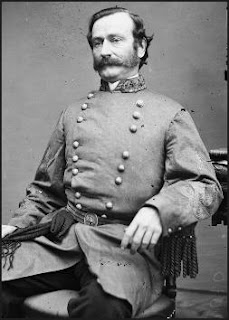William Bruce Mumford
It's bad enough for a soldier to die in war, but when civilians are killed it's worse, especially when that civilian is executed. William Bruce Mumford was one of those civilians. He was forty-one years old when the Federal Navy arrived in New Orleans, Louisiana. He'd served the United States in two previous wars. He'd fought in the Seminole War and was wounded in the leg during the Mexican War. He would walk with a limp for the remainder of his life. Mumford made no bones about where his loyalty lay in the upcoming conflict and would have served the state of Louisiana had he been physically capable.
From the USS Pocahontas a Captain Morris and several U.S. Marine's marched to the mint in town and removed the Confederate flag and replaced it with the U.S. flag. He did this without orders, the town itself had not yet been surrendered. A crowd soon arrived and became enraged over this act. Captain Morris notified them that removing the U.S. flag would result in them being fired on by the warship. Seven men, including Mumford decided to remove the flag anyway as it had been placed there illegally. The ship did indeed open fire on the seven men, but only Mumford was wounded by a flying piece of brick. Mumford limped to the mayor's office to present him the trophy, but the angry mob tore it to shreds as he went there. Upon arrival, there wasn't much of it left.
When the Federal Army finally arrived three days later, Union General Benjamin "Beast" Butler heard about the incident and demanded that Mumford must pay for this "crime." He ordered Mumford arrested and tried before a military court on charges of "high crimes...against the laws of the United States. Of course, he was found guilty in this "kangaroo court." It mattered not that the city wasn't even occupied or had surrendered when he removed the flag. It mattered not that he had served the United States as a soldier in two previous wars. Butler was basically judge and jury. He ordered Mumford to be hanged, but was kind enough to allow Mumford to decide the spot he would die. Mumford chose to be executed in the courtyard of the mint where the so-called "crime" had occurred.
Mary Mumford, William's wife asked General Butler to visit her and he complied. Despite the pleading of Mary and the children, Butler refused to save the man. Despite repeated pleas from different citizens, Butler remained unmovable on granting clemency.
The Site of Mumford's Execution
Butler allowed Mumford to say a few words before his execution. He proclaimed his devotion to the Confederacy, but he also spoke of his love for the U.S. Flag and what it's original meaning before it waged an unconstitutional war against weaker states. He proclaimed his love for the original U.S. Flag and his support for it through two of it's wars. After he was hanged, Louisiana Governor Tom Moore called him a hero. His body was left hanging in front of the mint for almost an hour. General Robert E. Lee demanded of General Henry Halleck why a civilian was hanged for removing a flag before a city had officially surrendered. President Jefferson Davis went a step further. Due to Butler's proclamation which basically called all New Orleans women "ladies of the night" and Mumford's hanging, he ordered that Butler was to be treated as a war criminal and if captured to be executed on the spot without a trial.
There is a funny irony to this part of the story. Prior to the presidential election of 1860, Butler believing that a moderate candidate could save the Union, had nominated Jefferson Davis for president fifty-seven times to no avail. Years later, Butler would arrange a job for Mumford's widow in Washington, D.C. Mumford was originally placed in a vault in Cypress Grove Cemetery, but he rests today at the foot of a Confederate monument in Greenwood Cemetery, New Orleans, Louisiana. He left behind a wife and five children ranging from age's five to thirteen.









